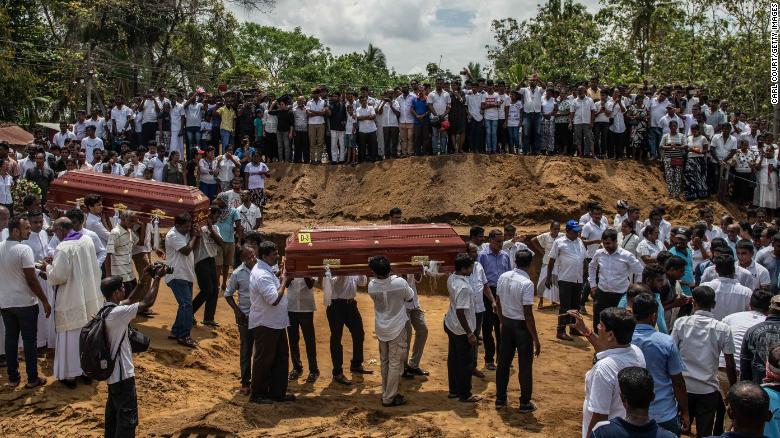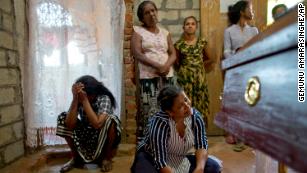By Peter Bergen
 Peter Bergen is CNN's national security analyst, a vice president at New America and a professor of practice at Arizona State University. He is the author of "United States of Jihad: Investigating America's Homegrown Terrorists." The opinions expressed in this commentary are his own. View more opinion articles at CNN.
Peter Bergen is CNN's national security analyst, a vice president at New America and a professor of practice at Arizona State University. He is the author of "United States of Jihad: Investigating America's Homegrown Terrorists." The opinions expressed in this commentary are his own. View more opinion articles at CNN.
(CNN)Sri Lankan Defense Minister Ruwan Wijewardene said Wednesday that most of the terrorists who killed at least 253 people at churches and hotels in Sri Lanka on Sunday were "well-educated and come from maybe middle- or upper-middle-class. So, they are financially quite independent, and their families are quite stable financially."
Two of the suicide bombers were the sons of a wealthy Sri Lankan spice trader, Mohamed Ibrahim, sources with knowledge of the investigation told CNN.
This likely runs counter to what many people may believe about suicide bombers. After all, why would well educated, upper-middle-class folks with seemingly everything to live for blow themselves up and kill so many innocents?
Of course, there is no simple answer for what must be a difficult decision, nor is there a one-size-fits-all description of how people radicalize to the point that they are willing to die while killing.
In the case of Sunni militants, this decision is likely enabled by their embrace of violent jihadist ideology, which is often sectarian in nature and encourages the murder of "infidels." This is often combined with the belief that Sunni Muslims are under attack and revenge must be taken.
Group dynamics can also play a role. The terrorism expert Marc Sageman in his 2004 book "Understanding Terror Networks" examined the biographies of 172 Sunni terrorists and found that friends and family members often joined jihadist groups together. Three pairs of Saudi brothers, for instance, were hijackers on 9/11. A similar dynamic can be seen with the two brothers among the suicide bombers in the Sri Lanka attacks.
Hundreds killed in Sri Lanka bomb attacks 02:21
In fact, terrorism experts have long known that terrorism is often a bourgeois endeavor.
Before we unpack that, let's stipulate that large insurgent groups that also practice terrorism, such as the Taliban, recruit tens of thousands of foot soldiers largely from the ranks of the poor and pay them a monthly wage.
That is why the Taliban are one of the largest drug cartels in the world: they have to meet a large payroll every month.
By contrast, pure terrorist groups are made up of true believers who are volunteers that are generally not being paid a wage.
Some of the most notorious terrorists of the modern era have been some of the most privileged people on the planet.
Osama bin Laden was the son of a Saudi construction magnate.
His successor as the leader of al Qaeda, Ayman al Zawahiri, is a surgeon from a prominent Egyptian family.
Umar Farouk Abdulmutallab, the so-called "underwear bomber" who tried to blow up an American passenger jet over Detroit on Christmas Day 2009, is the son of a wealthy Nigerian banker and was attending University College London, one of the top universities in the world, when he tried unsuccessfully to blow up Northwest Flight 253 with a bomb secreted in his underwear.
 The underwear bomber was directed on his mission by Anwar al-Awlaki, the US-born son of a Yemeni cabinet minister who was studying for his PhD at George Washington University before he joined al Qaeda in Yemen.
The underwear bomber was directed on his mission by Anwar al-Awlaki, the US-born son of a Yemeni cabinet minister who was studying for his PhD at George Washington University before he joined al Qaeda in Yemen.
The notorious ISIS terrorist "Jihadi John" -- Mohammed Emwazi -- who was responsible for the beheading of American journalist James Foley in 2014, was from "a well-to-do family who grew up in West London and graduated from college with a degree in computer programming," according to the Washington Post.
The lead 9/11 hijacker, Mohamed Atta, was the son of an Egyptian lawyer and was studying for a doctorate from a German university.
There are many other examples, but you get the point.
The fact that insurgent groups often recruit from the ranks of the unemployed poor suggests that an effective policy response would be to supply jobs for unemployed youths in countries such as Afghanistan.
That policy response wouldn't work for middle-class jihadist terrorists motivated by ideology. For those terrorists the best response is for knowledgeable Islamic clerics to dissuade them, or for defectors from jihadist groups to explain that killing innocents will not create the Islamist utopia that they yearn for.
Update: This story has been updated to reflect the death toll has been revised by the Sri Lankan Health Ministry.
No comments:
Post a Comment